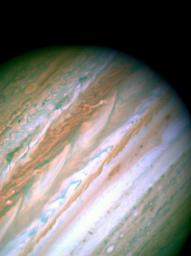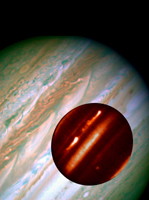
|
Jupiter Eruptions
- Click the image above for a larger view
- Full-Res JPEG (2000 x 2682) (290.4 kB)
- Full-Res TIFF (2000 x 2682) (16.1 MB)
Caption:

Click on the image for
high resolution image of
Nature
Cover
Detailed analysis of two continent-sized storms that erupted in Jupiter's atmosphere in March 2007 shows that Jupiter's internal heat plays a significant role in generating atmospheric disturbances. Understanding these outbreaks could be the key to unlock the mysteries buried in the deep Jovian atmosphere, say astronomers.
This visible-light image is from NASA's Hubble Space Telescope taken on May 11, 2007. It shows the turbulent pattern generated by the two plumes on the upper left part of Jupiter.
Understanding these phenomena is important for Earth's meteorology where storms are present everywhere and jet streams dominate the atmospheric circulation. Jupiter is a natural laboratory where atmospheric scientists study the nature and interplay of the intense jets and severe atmospheric phenomena.
According to the analysis, the bright plumes were storm systems triggered in Jupiter's deep water clouds that moved upward in the atmosphere vigorously and injected a fresh mixture of ammonia ice and water about 20 miles (30 kilometers) above the visible clouds. The storms moved in the peak of a jet stream in Jupiter's atmosphere at 375 miles per hour (600 kilometers per hour). Models of the disturbance indicate that the jet stream extends deep in the buried atmosphere of Jupiter, more than 60 miles (approximately100 kilometers) below the cloud tops where most sunlight is absorbed.
Cataloging Keywords:
| Name | Value | Additional Values |
|---|---|---|
| Target | Jupiter | |
| System | Jupiter | |
| Target Type | Planet | |
| Mission | Hubble Space Telescope (HST) | |
| Instrument Host | Hubble Space Telescope | |
| Host Type | Space Telescope | |
| Instrument | ||
| Detector | ||
| Extra Keywords | Ammonia, Atmosphere, Color, Plume, Storm, Water | |
| Acquisition Date | ||
| Release Date | 2008-01-25 | |
| Date in Caption | 2007-05-11 | |
| Image Credit | NASA/ESA | |
| Source | photojournal.jpl.nasa.gov/catalog/PIA10224 | |
| Identifier | PIA10224 | |
